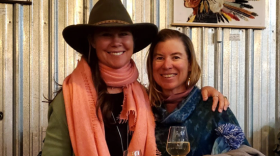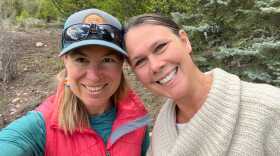
Christie Aschwanden
Host of Emerging FormsChristie Aschwanden is the author of the New York Times bestseller, GOOD TO GO: What the Athlete in All of Us Can Learn from the Strange Science of Recovery.
-
“The least dangerous humor is to make fun of yourself and your foibles,” says comedian Chris Duffy. How might such a sense of humor help jumpstart and nourish your creative life? In this episode of Emerging Form, we talk with Chris about
-
It’s the sixth annual epiphany episode! Join Rosemerry and Christie as we look back on the highs and lows of their own creative practices in 2025, and reflect on the intentions we set a year ago. Did Christie “Create the Space?” How did Rosemerry explore “Spaciousness?” What did we learn about failure? About collaboration? Join us for laughter and teasing and good old-fashioned vulnerability.
-
“I’m a striver,” poet Alison Luterman, “still striving to grow.” In this interview with the beloved poet, we follow up on our conversation from episode 64 “It’s Okay to Not Feel Talented, Keep Going Anyway,
-
How do we take care of our creative selves? How do we step off the wheel of production and find ourselves in the wide-open moment with room to wonder and wander? In this episode, hosts Rosemerry Wahtola Trommer and Christie Aschwanden have a conversation about where they are at now in their well-filling cycle, the importance of creative self-care and the consequences of not doing so.
-
Everyone has creative genius, says Diana Hill, PhD, and in her new book, Wise Effort: How to Focus Your Genius Energy on What Matters Most, she explores how to best explore and nurture that genius. We speak about how she battled some of her own demons while writing the book–the committee arguing in her head. We talk about wise effort–not trying too hard, and the three main practices that fuel wise effort–getting curious, opening and focusing. It’s a practical, vulnerable, lighthearted episode.
-
“The first draft is absolute torture,” says historical nonfiction writer David Baron. And yet, he persists and his newest book, The Martians: The True Story of an Alien Craze that Captured Turn-of-the-Century America has garnered rave reviews from The New York Times, Wall Street Journal, The New Yorker and more. The Christian Science Monitor says, “The Martians is a fascinating tale that’s beautifully told.” We speak with Baron about the joys of research, the agony of writing, the delight in rewriting, how imagination cuts both ways, and how Truman Capote’s work has influenced his own.
-
In this episode, we talk with Michael Kleber-Diggs about the importance of mentors and how sometimes they transition to colleagues as we find our own footing in our creative work, stepping into our own creative identity. He reads “What Name for This,” from his book Worldly Things, and we use the poem as a launching pad to talk about creative relationships, why we write and how attentiveness to the specific can lead us to questions about the universal, and making art out of the ordinary. And, in thinking about the role of the artist in a difficult time, Michael shares his controversial idea about the role of the artist in “dark times.”
-
One day, nationally acclaimed poet Maria Kelson hit “a poetry wall” for no identifiable reason. “It was frustrating,” she says, “because I had devoted myself to poetry. For 15 years, it was my primary focus.” What happened next–she followed an emerging passion, crime fiction. ‘As i was casting about I thought, I want to explore the dark side.” In this episode we talk with Maria about shedding layers of creative identity, finding new community, art as a way to explore and expose issues of social injustice, and the surprising ways poetry informs her new award-winning thriller.
-
When Starre Varten sat down to write her book The Stronger Sex: What Science Tells Us about the Power of the Female Body, she came to the project with two things: an intellectual thesis and a very personal bodily story. In this episode, we talk with Starre about how both mind and body fueled her creative practice. We also talk about how what began as an article became a book, how to turn toward the part of the book you might rather turn away from, how an outsider’s perspective can help us see our project more clearly and what it really means to be strong.
-
Making something is fun. Promoting it? Not so much… On this episode of Emerging Form, Rosemerry and Christie discuss the what happens when you put something you’ve created out into the world. How do you get it to your intended audience? How do encourage people to find it without feeling like an icky self-promotional nag? We also discuss the pain of realizing that your friends didn’t and won’t read or watch or listen to your new thing, the importance of remembering why you’re doing this, and the 100 day promotion project we tried (inspired by previous Emerging Form guests Chris Duffy and Zach Sherman) and what it taught us.











